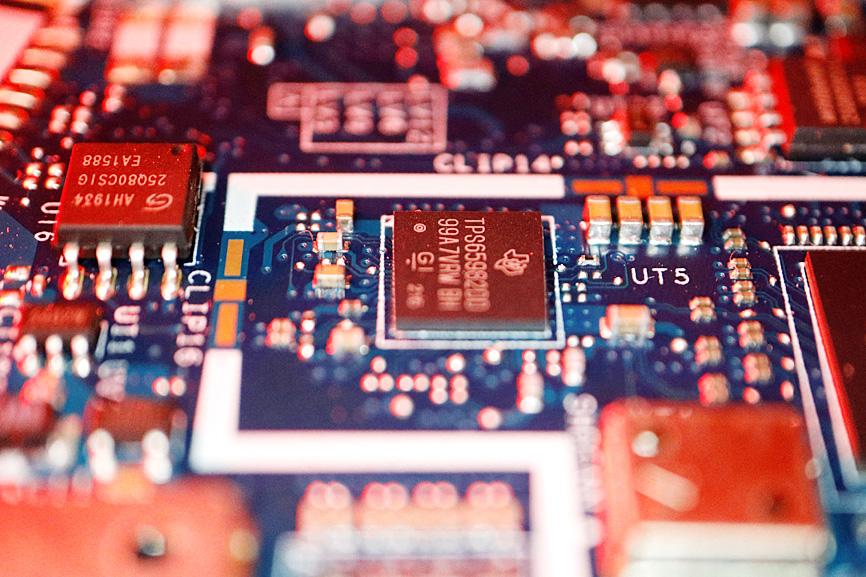The legislature’s Judiciary and Organic Laws and Statutes Bureau has called for a legislative amendment to better protect the nation’s semiconductor industry, which it said has been affected by global events such as Russia’s invasion of Ukraine and the COVID-19 pandemic.
The bureau said in a report that the Integrated Circuit Layout Protection Act (積體電路電路布局保護法) should be amended to better protect the industry and spur growth.
“Taiwan accounts for 70 percent of total wafer output worldwide, and the output value of Taiwan’s semiconductor industry is roughly 19.8 percent of the global total — second only to the US,” it said.

Photo: Reuters
Chip production is under pressure from the Ukraine war, which has halted operations of two major suppliers of neon gas — a key material for making chips, the report said.
As chips become more important and supply contested, some countries have been amending their laws to protect chip production and related intellectual properties, it said.
For example, the US has passed the Creating Helpful Incentives to Produce Semiconductors and Science Act to boost semiconductor research and encourage investment in the industry, while South Korea in November last year unveiled its K-Semiconductor Belt Strategy that includes a US$450 billion investment in the country’s chip industry, the report said.
India announced a US$10 billion investment in December last year and the European Commission unveiled a similar plan in February this year, which is expected to result in a 43 billion euro (US$44.1 billion) investment in the industry, it said.
The government’s strategy for boosting the competitiveness of Taiwan’s semiconductor industry relies primarily on providing subsidies and incentives to companies and individuals, the report said.
However, while there have been regular amendments to the Income Tax Act (所得稅法), the Company Act (公司法) and other laws, the Integrated Circuit Layout Protection Act has not been amended in 20 years, it said.
One reason might be that due to changes in semiconductor industry practices, fewer firms have been seeking registration and protection of integrated circuit layouts — which is the primary function of the law, it said.
Companies consider the protection of trade secrets important, but they have adopted different strategies to do so, such as seeking patent applications, the report said, adding that laws should be regularly reviewed and revised according to the industry’s changing needs.

Chinese spouse and influencer Guan Guan’s (關關) residency permit has been revoked for repeatedly posting pro-China videos that threaten national security, the National Immigration Agency confirmed today. Guan Guan has said many controversial statements in her videos posted to Douyin (抖音), including “the red flag will soon be painted all over Taiwan” and “Taiwan is an inseparable part of China,” and expressing hope for expedited reunification. The agency last year received multiple reports alleging that Guan Guan had advocated for armed reunification. After verifying the reports, the agency last month issued a notice requiring her to appear and explain her actions. Guan

The Kaohsiung Tourism Bureau audited six hotels in an effort to prevent price gouging ahead of Korean band BTS’ concert tour in the city scheduled for Nov. 19, 21 and 22 this year. The bureau on Friday said that the audits — conducted in response to allegations of unfair pricing posted on social media — found no wrongdoing. These establishments included the local branches of Chateau de Chine, Hotel Nikko, My Humble House, and Grand Hai Lai, it said, adding that the Consumer Protection Commission would have penalized price gougers had the accusations been substantiated. The bureau said the Tourism Development Act

BACK TO WINTER: A strong continental cold air mass would move south on Tuesday next week, bringing colder temperatures to northern and central Taiwan A tropical depression east of the Philippines could soon be upgraded to be the first tropical storm of this year, the Central Weather Administration (CWA) said yesterday, adding that the next cold air mass is forecast to arrive on Monday next week. CWA forecaster Cheng Jie-ren (鄭傑仁) said the first tropical depression of this year is over waters east of the Philippines, about 1,867km southeast of Oluanpi (鵝鑾鼻), and could strengthen into Tropical Storm Nokaen by early today. The system is moving slowly from northwest to north, and is expected to remain east of the Philippines with little chance of affecting Taiwan,

GIVE AND TAKE: Blood demand continues to rise each year, while fewer young donors are available due to the nation’s falling birthrate, a doctor said Blood donors can redeem points earned from donations to obtain limited edition Formosan black bear travel mugs, the Kaohsiung Blood Center said yesterday, as it announced a goal of stocking 20,000 units of blood prior to the Lunar New Year. The last month of the lunar year is National Blood Donation Month, when local centers seek to stockpile blood for use during the Lunar New Year holiday. The blood demand in southern Taiwan — including Tainan and Kaohsiung, as well as Chiayi, Pingtung, Penghu and Taitung counties — is about 2,000 units per day, the center said. The donation campaign aims to boost